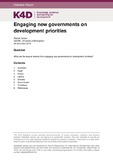| dc.contributor.author | Cooper, Rachel | |
| dc.coverage.spatial | Egypt | en |
| dc.coverage.spatial | Kenya | en |
| dc.coverage.spatial | Liberia | en |
| dc.coverage.spatial | Somalia | en |
| dc.coverage.spatial | South Sudan | en |
| dc.coverage.spatial | Zimbabwe | en |
| dc.date.accessioned | 2019-12-03T11:20:28Z | |
| dc.date.available | 2019-12-03T11:20:28Z | |
| dc.date.issued | 2019-11-29 | |
| dc.identifier.citation | Cooper, R. (2019). Engaging new governments on development priorities. K4D Helpdesk Report 715. Brighton, UK: Institute of Development Studies. | en |
| dc.identifier.uri | https://opendocs.ids.ac.uk/opendocs/handle/20.500.12413/14800 | |
| dc.description.abstract | This rapid literature review considers donor engagement with newly elected governments in aid recipient countries. It sought to focus on the immediate period after a new administration is elected and takes office. However, despite the importance of donor-government engagement, few studies were located during the timeframe of this review that focus on how donors should engage newly elected governments on development priorities. The small number of studies that consider this issue largely detail challenges for donors, as opposed to lessons learned or best practice. Reports and strategies released by donors tend to emphasis positive elements of their relationships with aid recipient countries during a government transition period.Very few academic or grey literature studies consider how donors should engage newly elected governments. There is a body of studies related to how donors should engage prior to and during elections, but they do not seem to cover the post-election period. Similarly, studies focused on conflict and peacebuilding in conflict affected and fragile states seem to focus on the modalities or architecture for donor support including multi-donor trust funds and fora for donors and recipient states to meet, but not explicitly for newly elected governments. Despite the extremely limited evidence base, this review draws on a small number of case studies and reports written by donor government research services which touch on the challenges for engaging newly elected governments. This report includes evidence from six aid recipient countries, including examples from conflict affected or fragile states, with varying levels of aid dependency. Country selection was partly driven by the limited evidence base, although the report sought to focus on presidential systems with a recent election. | en |
| dc.language.iso | en | en |
| dc.publisher | IDS | en |
| dc.relation.ispartofseries | K4D Helpdesk Report;715 | |
| dc.rights.uri | https://www.nationalarchives.gov.uk/doc/open-government-licence/version/3/ | en |
| dc.subject | Aid | en |
| dc.subject | Development Policy | en |
| dc.subject | Governance | en |
| dc.title | Engaging New Governments on Development Priorities | en |
| dc.type | Helpdesk | en |
| dc.rights.holder | © DFID - Crown copyright 2019 | en |
| dcterms.dateAccepted | 2019-11-29 | |
| rioxxterms.funder | Department for International Development, UK Government | en |
| rioxxterms.identifier.project | K4D | en |
| rioxxterms.version | VoR | en |
| rioxxterms.funder.project | 238a9fa4-fe4a-4380-996b-995f33607ba0 | en |

